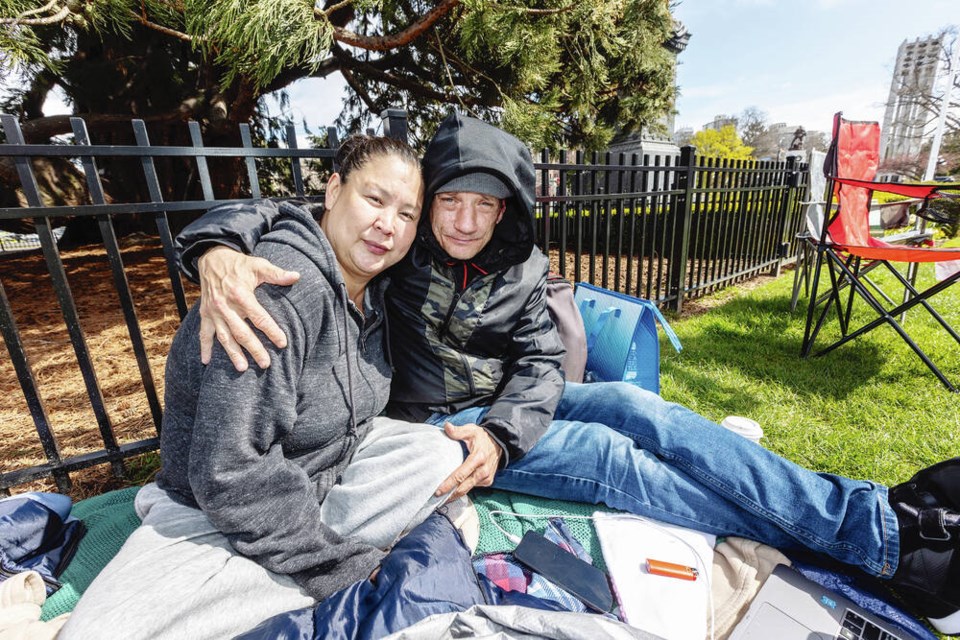Calls intensified Wednesday for the province to explain why a one-month-old baby has been removed from her mother’s care, a situation that critics say is part of a pattern of systemic racism against Indigenous parents.
Sonja and Philip Hathaway of Campbell River have been camping in front of the B.C. legislature since Monday after their baby, Amella, was apprehended without warning.
Sonja gave birth to her daughter on March 11 in Victoria General Hospital. The baby was two months’ premature and weighed just three pounds.
The parents kept a bedside vigil as Amella remained in neonatal intensive care. Philip said three days after Amella was born, the couple was asked to sign a safety order agreeing to abstain from alcohol and drugs, and to avoid fighting around the child.
The couple asked for legal advice but were made to sign the safety order on the spot, they said. On Monday, Sonja and Philip left the hospital briefly and when they returned, they were told the child had been removed by social workers. They say they have not been given any documentation or explanation as to why.
“It was heartbreaking,” Sonja said, showing pictures on her phone of herself and her husband cuddling their swaddled newborn.
“We were devastated,” Philip said as he made a sign that said “My child was stolen.”
B.C. Green Party Leader Sonia Furstenau, who has spoken with the couple, said the handling of the case flies in the face of legislation passed last year that legally recognizes the right of Indigenous communities to have control over their own child and family welfare services.
The fact that the couple is in the dark about their child’s apprehension is emblematic of the veil of secrecy surrounding child-welfare cases, Furstenau said.
“This is generations of child welfare policy oriented toward systemic racism against Indigenous people,” she said. “Was every measure taken to keep this mother and her infant together? Was the consideration of this child’s human right to breastfeed taking into consideration? Was every measure taken to find housing for her?”
The two, who were working with B.C. Housing to secure a stable home, were living aboard a makeshift boat built from recycling containers, water bottles and wood, and moored in the Campbell River estuary.
After media coverage of their unconventional living arrangements in October, someone from the Ministry of Children and Family Development reached out offering support. Sonja, who is from the Dene Tha First Nation in northern Alberta, met with a social worker weekly and opened up about her alcohol use, which she says stemmed from the 2020 loss of her first child during pregnancy.
She now believes the information was used against her.
“What we have is a situation where this mother, her partner, and their future child had been working with [the ministry] for months so they wouldn’t get to this situation,” said B.C. Green MLA Adam Olsen, who is from the Tsartlip First Nation.
That sends a message, he said, that “calling [the Ministry of Children and Family Development] is the most dangerous thing you can do in this province.”
The couple was told part of the ministry’s concern stems from a domestic violence incident on Dec. 15 in Campbell River. Philip was charged with assault, and a no-contact order between the couple was established, but ended in February.
Ministry staff were trying to convince Sonja to move to a transition home without her husband, she said.
Minister of Children and Family Development Mitzi Dean said she can’t speak specifically about the case or confirm whether the ministry is involved.
She said the ministry knows it is important for children to stay connected to their families, community and culture. “In any situation where social workers have a concern, they are continuously looking at all options to make sure they can provide services to keep families together and keep children safe.”
Dean said B.C. is working to address the over-representation of Indigenous children in the child-welfare system, where 68 per cent of children in care are Indigenous even though they make up less than 10 per cent of the B.C. population.
B.C. currently has the lowest number of Indigenous children in care in 20 years, she said.
The couple was able to see the baby on Tuesday and was scheduled for another visit on Wednesday. Sonja has been pumping so her daughter can be fed breast milk.
Philip says they will remain in front of the legislature until they get their child back.



